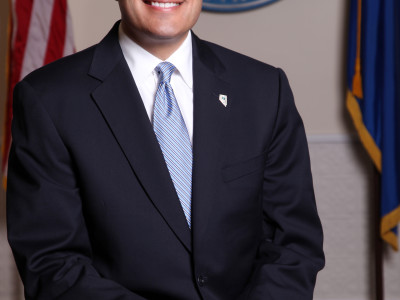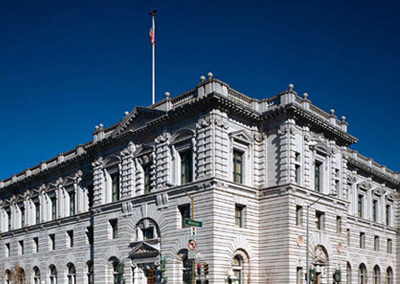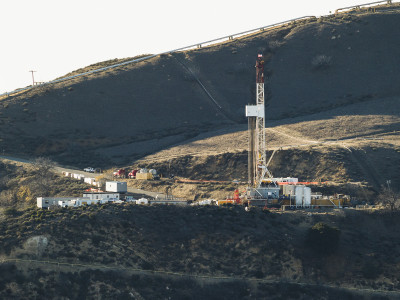Risk Subsidies and the Future of Nuclear Power in the U.S.
Should We Take Into Account Government Subsidies that Reduce the Risks Borne by the Nuclear Industry as We Consider Our Energy Future?
As I’ve written about before, U.S. law massively subsidizes the nuclear power industry. In particular, a law called the Price-Anderson Nuclear Industries Indemnity Act dramatically skews the incentives to develop nuclear plants, and to site them in places where there is a lot of risk, because it requires the public to bear much of the financial risk associated with physical risk from nuclear facilities by capping operators' liability. The Act also pools all operators...
CONTINUE READINGNevada Governor Sandoval on Obama’s Short List of Supreme Court Candidates
How Would a Justice Sandoval Vote on Environmental Issues?
Multiple news sources reported Wednesday that the Obama Administration has floated the first identified candidate the President is considering nominating to the U.S. Supreme Court to replace Justice Antonin Scalia, who died unexpectedly earlier this month. That candidate is a most intriguing and unconventional one: Nevada Governor Brian Sandoval--a Republican. Sandoval, 52, received his law degree from Ohio State University and practiced law in Reno, Nevada for ...
CONTINUE READINGUnleashing the Lower Courts
Justice Scalia's death greatly expands the maneuvering room for liberal judges.
There's already been a lot written about how Justice Scalia's untimely death will affect pending cases, not to mention speculation about the possible nominees to replace him. Less attention has been given to the effect on the lower courts. Yet Justice Scalia's departure gives liberal judges in lower courts more freedom than they've had in the past. Here, I'm specifically thinking of the D.C. Circuit and the Ninth Circuit, which between them are the most important f...
CONTINUE READINGLessons from Aliso Canyon, Part II
Leaks in Regulation
Today, Southern California Gas announced it has successfully and permanently stopped the methane leak at its Aliso Canyon storage site. This marks the (fingers-crossed) end of a multi-month environmental crisis in northwest Los Angeles, causing residents to move and schools to close. Earlier this month, I blogged about the possible lessons we could learn from the methane leak at the Aliso Canyon natural gas storage facility about California’s regulation of th...
CONTINUE READINGDoes Sri Srinivasan’s Clean Power Plan Role on the D.C. Circuit Panel Hurt His Nomination Chances?
He may feel compelled to recuse himself, lowering the odds that the CPP is upheld in the Court of Appeals
Some environmentalists are already criticizing Sri Srinivasan's environmental credentials because as a lawyer at O'Melveny & Meyers he defended Exxon Mobil and Rio Tinto, a mining company, in cases alleging human rights abuses in Indonesia and Papau New Guinea. He also represented Enron villain Jeff Skilling. But I wonder if Srinivasan's nomination raises a different, more immediate liability: he is currently on the three-judge D.C. Circuit Court of Appeals panel...
CONTINUE READINGThe Tricky Problem of Cumulative Exposures
A new UCLA report finds reason to be concerned about cumulative risk, and notes that under CA law regulators are required to act
We are all exposed to hundreds, if not thousands of chemicals through consumer products, air pollution, drinking water, and occupational exposures, just to name a few. Yet chemicals and pollutants are largely assessed and regulated individually. Increasingly, environmental health professionals have been attempting to grapple with assessing the risk of exposure to multiple chemicals. New research suggests that this concern about possible "cumulative effects," ...
CONTINUE READINGWhat Does Justice Scalia’s Death Mean for the Clean Power Plan?
Basically, everything
I am very sensitive to the emotions surrounding the sudden death of Justice Antonin Scalia and feel deep sympathy for his family, many friends and colleagues. He was a towering intellectual force and we will be dissecting his influence for years to come. Yet the death of a public figure -- especially one as important and significant as Scalia -- has obvious and immediate ramifications far beyond the pain and loss his loved ones feel for him. And on environmental i...
CONTINUE READINGMitch McConnell’s “War on Coal Miners”
McConnell seems to care more about political payback than the miners' welfare.
Mitch McConnell's website trumpets that last fall he received an award from the Washington Coal Club "for his work to defend Kentucky’s coal jobs, miners and their families." His concern for miners turns out not to be so deep. As the Washington Post reported last week, he single-handedly blocked a measure to rescue health and pension benefits for over a hundred thousand retired and disabled miners nationally. It would be unfair to say that McConnell hasn't ...
CONTINUE READINGJustice Scalia and Environmental Law
Scalia's decisions were almost unremittingly anti-environmental.
Over the past three decades, Justice Scalia did much to shape environmental law, nearly always in a conservative direction. Because of the importance of his rulings, environmental lawyers and scholars are all familiar with his work. But for the benefit of others, I thought it might be helpful to summarize his major environmental decisions. The upshot was to restrict EPA's authority to interpret environmental statutes, make property rights a stronger bulwark agains...
CONTINUE READINGReflections on the Coastal Commission’s Implosion
The Implications of the Decision to Fire Charles Lester - and the Decision Not to Explain It
As Rick Frank insightfully discussed earlier this week, the California Coastal Commission has fired its former executive director, Charles Lester. Readers interested in more background information and analysis should read Rick’s post, as well as the excellent reporting by Tony Barboza and others from the LA Times. (And anyone who wants to hear about it can also listen to this archived podcast from earlier this week, in which I discussed it on KPCC-FM.) I won’t rehash...
CONTINUE READING











